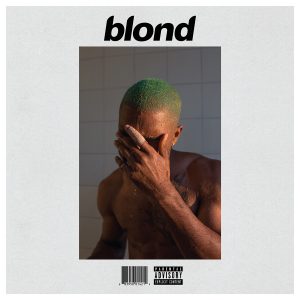Frank Ocean surprises fans with album Blonde

Photo courtesy of Def Jam Recordings Four years, no call · Frank Ocean released his sophomore album Blonde on Saturday, after years of anticipation from fans. It came available after Ocean’s visual album Endless was made available on Apple Music.
The seemingly endless postponing of singer Frank Ocean’s album finally came to an end with the release of Blonde Saturday. Four years after his critically acclaimed debut, Channel Orange, Blonde arrived to his fans with anticipation, frustration and elation due to the huge time gap in between his works.
An original member of hip-hop collective Odd Future, and songwriter for Beyoncé, John Legend and many others, Ocean showcases his talents in an experimental project that can be considered neo-soul that is heavily influenced by hip-hop as well as rock and electronic production. Avoiding social media, the artist known for his hit song, “Thinkin Bout You,” did not release any details regarding his album release. He is credited as the executive producer, with his name throughout the credits of the album. This recording period might be a testament to Ocean’s perfectionism to what he considers a concept album in Blonde, which is clearly not a follow-up to Channel Orange, but a progression in his own experiments.
“Nikes,” the first track which was released with a music video on Apple Music, features a pitched-up voice for the first two-thirds of the song, referencing to recent historical events and pop culture phenomena. His half-rap, half-sung composition permeates throughout the album in different pitches and tones, yet there are many unfiltered points where he lets his range shine effortlessly. One of those moments is in the chorus of “Solo,” where he paints a picture of his life between heaven and hell as he finds himself split from a lover. The following track, “Skyline To,” builds upon that with a mellow, echoey guitar with reverberations and background noise that mimics an outdoor set recording. As the album unfolds, there is a painstaking attention to detail in creating a soundscape that Ocean monitors through every frequency, supported by Assistant Producer Malay, who also served as a producer in Channel Orange.
In the complex arrangement of “Nights,” Ocean is able to weave guitars and sub-synths seamlessly on with a natural tone and then transform the entire mood with a humming harmonization of his voice and electronic tones in a way which only his music does. On the less hectic tracks like “White Ferrari” and “Seigfried,” the production does an exceptional job of making otherwise mundane synth progressions pop out with lively mastering that complements his voice. It takes a more analog-sounding approach in an age where computer-generated and digitally-created instruments often rule. Similar to the aesthetics that Ocean has used for previous album artworks, he avoids the high-tech for quality and liveliness, and gives a nod to artists who have produced in the same fashion by sampling Stevie Wonder and interpolating The Beatles into the album. The transition between “Seigfried” and “Godspeed” exemplifies many of these qualities. Both tracks may have been the ones most difficult to create technically, and are combined with Ocean’s powerful lyrics. “Godspeed” features a prayerful love song, but both songs blossom into instrumental outros that sharply contrast the style in which they begin.
Ocean crosses conventional rule of thumb not only by overpowering effects or hard slices and chops as one may hear on an album like The Life of Pablo, but also be maintaining a method to his madness that makes it a superb concept piece. Blonde is a work meant to be listened to as a whole, along with audiophile speakers or headphones to appreciate the nuances and transitions in each song. Frank Ocean has never been one to be creatively restrained, as Nostalgia, Ultra and Channel Orange spread across a spectrum of styles and influences with spoken word bits in between.
Blonde pushes the envelope even further, as the album is the fulfillment of what one may expect a blueprint of a true to heart Frank Ocean album would be: progressive, unorthodox, sonically detailed, a bit disorganized, but perfectly polished. Rather than submit to public or corporate demand, Ocean’s strive for perfection is not meant to emulate his influencers or a particular style, but to bring his own concept album to life with precise details to the musical equivalent of an atom. Whereas some may view it as taking a creative risk or a necessary journey in an artist’s catalogue, Blonde is Ocean’s expression at its finest form. Frank Ocean has found and constructed his own tangible musical fingerprint from pure concept, and it is probable that he would have it no other way: perfectly unique.
